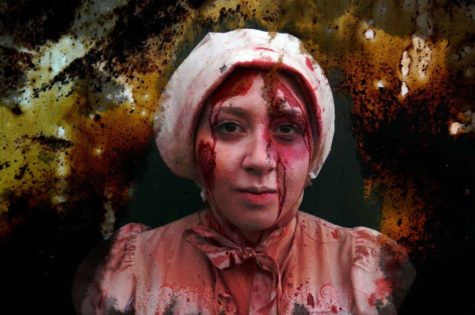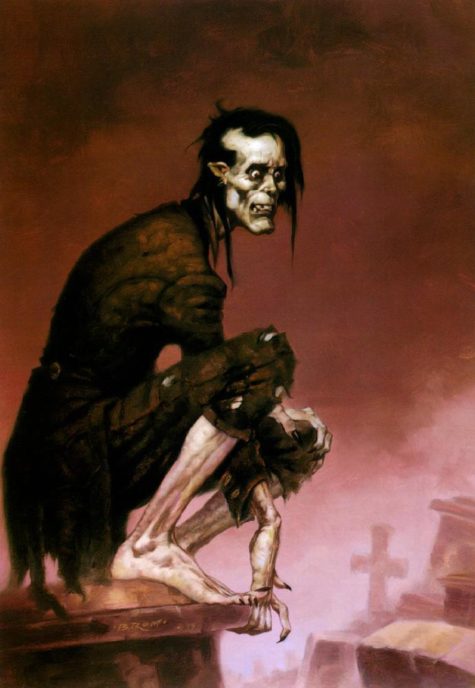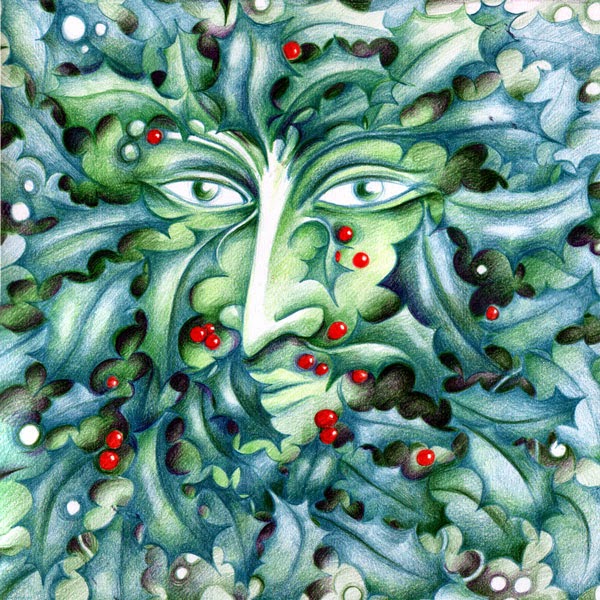Ghoul
The Ghoulish Case of Constance Armande
From the book Werwolves, by Elliott O’Donnell, first published in 1912, we have this account of the ghoulish case of Constance Armande.
The following incident was related to me as having occurred recently in Brittany. A young girl named Constance Armande, in a good station of life, much against the wishes of her family, took up spiritualism and constantly attended seances.
At these seances she witnessed all sorts of phenomena – some in all probability produced by mere trickery on the part of the medium or a confederate, whilst others were, without doubt, the manifestations of bona fide spirits – earthbound phantasms of the lowest and most undesirable order – murderers, lunatics, Vice Elementals, and ghouls.
It is most unwise to risk coming in contact with such spirits, for when they have once made your acquaintance they will attach themselves to you, and are got rid of only with the greatest difficulty. They were most unremitting in their persecution of Constance Armande; they followed her home, and were always rapping on the walls of her room and disturbing and annoying her.
In short, she got no peace, either asleep or awake. In the night she would often wake up screaming, and in an agony of mind rush into her parents’ room and implore their protection, declaring she had dreamed in the most vivid manner possible that frightful-looking creatures, too awful for her to describe, were trying to prevent her awaking in order to keep her with them always.
She told a spiritualist, and he informed her that such dreams were not in reality dreams at all, but projections – that she had, at seances, acquired the power of projection; and, having no control over that power, she projected herself unconsciously, the projection almost always taking place in her sleep.
A medical expert was also consulted, and in accordance with his advice Constance Armande went to the seaside and resorted to every kind of pleasure – balls, concerts, and theatres. But the annoyances still continued, and she was seldom permitted to rest a whole night without being disturbed in a most harrowing manner.
Being a really beautiful girl, she had countless admirers, and eventually she became engaged to Alphonse Mabane, the only son of a very wealthy widow.
Shortly before the day fixed for their marriage Madame Mabane was seized with a fit of apoplexy and died. Every one, especially Constance Armande, was overwhelmed with grief, whilst preparations were made for a most impressive funeral.
On the afternoon of the day preceding that on which the funeral was to take place Constance, complaining of a bad headache, went to lie down on her bed, and two hours later strange footsteps were heard coming out of her room and bounding down the stairs. Wondering who it could be, Madame Armande ran to look, and was astonished beyond measure to see Constance – but a Constance she hardly knew – a Constance with the glitter of a ferocious beast in her eyes, and a grim, savage expression in the corners of her mouth.
She did not appear to notice her mother, but passed her by with a light, stealthy tread, utterly unlike her usual walk, crossed the hall, and went out at the front door. Madame Armande was too startled to try and intercept her, or even to make any remark, and returned to the drawing-room greatly agitated.
As hour after hour passed and Constance did not come home, her alarm increased, and she mentioned the incident to her husband, who caused immediate inquiries to be made. Just about the hour the family usually retired to rest there came a violent ring at the front-door bell. It was Alphonse Mabane, pale and ghastly.
“Have you found her?” Monsieur and Madame Armande cried, catching hold of him in their agitation, and dragging him into the hall.
Alphonse nodded. “Let me sit down a moment first,” he gasped. “It will give me time to collect my senses. My nerves are all to pieces!”
He sank into a chair, and, burying his face in his hands, shook convulsively. Monsieur and Madame Armande stood and watched him in agonized silence. After some minutes – to the Armandes it seemed an eternity – spent in this fashion, Alphonse raised his head.
“Your servant,” he said, “came to my house at nine o’clock and asked if Mademoiselle Constance was with me. I said ‘No,’ that I had not seen her all day, and was much alarmed when I was informed that she had left home early in the afternoon and had not yet returned.
I said I would join in the search for her, and was in my bedroom putting on my overcoat, when there came a tap at my door, and Jacques, my valet, with a face as white as a sheet, begged me to go with him upstairs. He led me to the door of my mother’s room, where she lay in her coffin, not yet screwed down. ‘Hark!’ he whispered, touching me on the sleeve, ‘do you hear that?’
“I listened, and from the interior of the room came a curious noise like munching – a steady gnaw, gnaw, gnaw. ‘I heard it just now,’ he whispered, ‘when I was going to shut the landing window – and other sounds, too. Hush!’
“I held my breath, and heard distinctly the swishing and rustling of a dress.
“‘Have you been in?’ I asked.
“He shook his head. ‘I daren’t,’ he whispered. ‘I wouldn’t go in by myself if you were to offer me a million pounds,’ and he trembled so violently that he had to lean against me for support.
“A great terror then seized me, and bidding Jacques follow, I crept downstairs and summoned the rest of the servants. Armed with sticks and lights, we then went in a body to my mother’s room, and throwing open the door, rushed in.
“The lid of the coffin was off, the corpse was lying huddled up on the floor, and crouching over it was Constance. For God’s sake don’t ask me to describe more – the sounds we heard explained everything. When she saw us she emitted a series of savage snarls, sprang at one of the maids, scratched her in the face, and before we could stop her, flew downstairs and out into the street. As soon as our shocked senses had sufficiently recovered we started off in pursuit, but have not been able to find the slightest trace of her.”
At the conclusion of Monsieur Mabane’s story the search was continued. The police were summoned, and a general hue and cry raised, with the result that Constance was eventually found in a cemetery digging frantically at a newly made grave.
At last brought to bay in the chase that ensued, fortunately for her and for all concerned, she plunged into a river, was swept away by the current, and drowned.
This case of Constance Armande seems to me to be clearly a case of ghoulism. What the spiritualist had told her was correct – she had projected herself unconsciously, and the hideous things she imagined were phantoms in a dream were Elementals – ghouls – her projected spirit encountered on the superphysical plane.
After sundry efforts to steal her body when she was thus separated from it, one of them had at length succeeded, and, incarcerated in her beautiful frame, had hastened to satisfy its craving for human carrion.
A Ghoulish Story
The case of Sergeant Bertrand, which is the last authenticated case of this kind, occurred in 1847, when, on the 10th of July, an investigation was held before a military council presided over by Colonel Manselon.
For some months the cemeteries in and around Paris had been the scenes of frightful violations, the culprits (or culprit), in some extraordinary manner, eluding every attempt made to ensnare them. At one time the custodians of the cemeteries were suspected, then the local police, and for a brief space suspicion fell even on the relations of the dead.
The first burial-place to be so mysteriously visited was the Cemetery of Pere Lachaise. Here, at night, those in charge declared they saw a strange form, partly human and partly animal, glide about from tomb to tomb. Try how they would they could not catch it – it always vanished – vanished just like a phantom directly they came up to it; and the dogs when urged to seize it would only bark and howl, and show indications of the most abject terror.
Always when morning broke the ravages of this unsavoury visitant were only too plainly visible – graves had been dug up, coffins burst open, and the contents nibbled, and gnawed, and scattered all over the ground. Expert medical opinion was sought, but with no fresh result. The doctors, too, were agreed that the mutilations of the dead were produced by the bites of what certainly seemed to be human teeth.
The sensation caused by this announcement was without parallel; and one and all, old and young, rich and poor, were wanting to know whatever sort of being it could be that possessed so foul an appetite. The watch was doubled; all to no purpose. A young soldier was arrested, but on declaring he had merely entered the cemetery to meet a friend, and exhibiting no evidences of guilt, was let go.
At length the violation ceased in Pere Lachaise and broke out elsewhere. A little girl, greatly beloved by her relatives and friends, died, and a big concourse of people attended the funeral. On the following morning, to the intense indignation of every one, the grave was discovered dug up, the coffin forced open, and the body half eaten.
In its wild fury at such an unheard-of atrocity the public called loudly for the culprit. The father of the dead girl was first of all arrested, but his innocence being quickly established, he was set free. Every means was then taken to guard against any recurrence, but in spite of all precautions the same thing happened again shortly afterwards; and happened repeatedly.
The fact that the cemetery was surrounded by very high walls, and that iron gates, which were always kept shut, formed the only legitimate entrance, added to the mystery, and made it seem impossible that any creature of solid flesh and blood could be responsible for the outrages.
Having observed that at one place, in particular, the wall, though nearly ten feet high, showed signs of having been frequently scaled, an old army officer set a trap there, consisting of a wire connected with an explosive, which was so arranged that no one could climb over the wall without treading on the wire and causing an explosion.
A strong posse of detectives kept watch, and at midnight a loud report was heard. The detectives were not, however, as quick as their quarry. They saw a man, or what they took to be a man, and fired at him, but he was gone like a flash of lightning, scaling the wall with the agility of a monkey. Finding a trail of blood, however, and pieces of torn uniform accompanying the bloodstains, they concluded that the enemy was wounded, and that the marauder was, moreover, a soldier.
Still, it is doubtful whether his identity would have been proved, had not one of the grave-diggers of the cemetery chanced to overhear some sappers of the 74th Regiment remark that on the preceding night one of their comrades – a sergeant – had been conveyed to the military hospital of Val de Grace badly wounded. The matter was at once inquired into, and the wounded soldier, Sergeant Bertrand, was found to be the author of the long series of hideous violations.
Bertrand freely confessed his guilt, declaring that he was driven to it against his own will by some external force he could not define, and which allowed him no peace. He had, he said, in one night exhumed and bitten as many as fifteen bodies. He employed no implements, but tore up the soil after the manner of a wild beast, paying no heed to the bruising and laceration of his hands so long as he could get at the dead.
He could not describe what his sensations were like when he was thus occupied; he only knew that he was not himself but some ravenous, ferocious animal. He added, that after these nocturnal expeditions he invariably fell into a profound sleep, often before he could get home, and that always, during that sleep, he was conscious of undergoing peculiar metamorphosis.
When interrogated, he informed the court of inquiry that, as a child, he preferred the company of all kinds of animals to that of his fellow creatures, and that in order to get in close touch with his four-footed friends he used to frequent the most solitary and out-of-the-way places – moors, woods, and deserts.
He said that it was immediately after one of these excursions that he first experienced the sensation of undergoing some great change in his sleep, and that the following evening, when passing close to a cemetery where the grave-diggers were covering a body that had just been interred, yielding to a sudden impulse, he crept in and watched them.
A sharp shower of rain interrupting their labours, they went away, leaving their task unfinished. “At the sight of the coffin,” Bertrand said, “horrible desires seized me; my head throbbed, my heart palpitated, and had it not been for the timely arrival of friends I should have then and there yielded to my inclinations. From that time forth I was never free – these terrible cravings invariably came on directly after sunset.”
Medical men who examined Bertram unanimously gave it as their opinion that he was sane, and could only account for his extraordinary nocturnal actions by the supposition that he must be the victim of some strange monomania. His companions, with whom he was most popular, all testified to his amiability and lovable disposition.
In the end he was sentenced to a year’s imprisonment, and after his release was never again heard of.
James Cheney: Invocation To The Dark Mother
Daniel: Prayer Before The Final Battle
blessed obyno: Queen of Ghosts
blessed obyno: Queen of Ghosts
Caerlion Arthur: The Great, Bloody and Bruised Veil of the World





